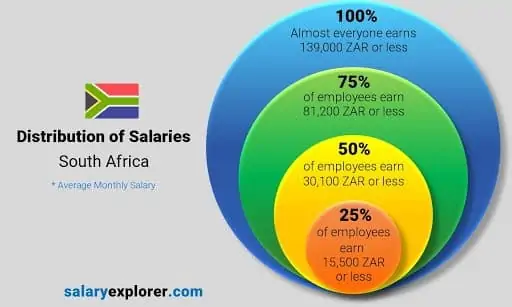
According to the quarterly employment survey (QES) by Stats SA for the third quarter of the year September 2023, the average salary in South Africa is now R26,086 a month, up 0.9% from the previous quarter, where it was R25,866, and up 4.7% from the fourth quarter of 2022 at R24,916. The median monthly salary in South Africa is R29,900, which implies that half of the population (50%) earns less than R29,900 per month and the other half earns more than R29,900 per month.
Total gross earnings paid to employees increased by R16,7 billion or 2,0% from R833,6 billion in June 2023 to R850,2 billion in September 2023. This was largely due to increases in the following industries: community services, trade, manufacturing, business services, construction, transport, electricity, and mining. The year-on-year total gross earnings increased by R51,6 billion or 6,5% between September 2022 and September 2023.
Basic salary/wages paid to employees increased by R15,2 billion or 2,0% from R759 billion in June 2023 to R774,3 billion in September 2023. This was largely due to increases in the following industries: community services, trade, business services, manufacturing, mining, transport, and electricity. However, according to Stats SA, there were decreases in the following industries: transport, trade, manufacturing, construction, and electricity. The year-on-year basic salary/wages increased by R44,9 billion or 6,2% between September 2022 and September 2023.
According to the survey results, total employment increased by 31 000 or 0,3% quarter-on-quarter, from 10 145 000 in June 2023 to 10 176 000 in September 2023. This was largely due to the total increase in the following industries: community services (42 000 or 1,4%), trade (4 000 or 0,2%), transport (2 000 or 0,5%) and mining (2 000 or 0,4%). The electricity sector reported no change. However, there were decreases in the following industries: business services (-7 000 or -0,3%), manufacturing (-7 000 or -0,6%), and construction (-5 000 or -1,0%).
Total employment increased by 256,000 or 2,6% year-on-year between September 2022 and September 2023. However, full-time employment decreased by 3,000 quarter-on-quarter, from 8 792 000 in June 2023 to 8 789 000 in September 2023 which was largely driven by a significant loss in part-time workers in community services and full-time workers in the construction industry.
The QES data differs from the Quarterly Labour Force Survey (QLFS) in that the QES data reflects the number of people receiving salaries and does not reflect employment/unemployment trends, which are covered by the QLFS. The QLFS for Q4 2023 showed an increase in the country’s unemployment rate. The official unemployment rate increased by 0,2 of a percentage point from 31,9% in the third quarter of 2023 to 32,1% in the fourth quarter of 2023. The unemployment rate according to the expanded definition decreased by 0,1 of a percentage point to 41,1% in Q4: 2023 compared to Q3: 2023.
The survey results indicate that the number of employed persons decreased by 22,000 to 16,7 million in the fourth quarter of 2023 compared to the third quarter of 2023. Formal sector employment decreased by 128 000 in Q4: 2023, while informal sector employment increased by 124 000 over the same period. The industries that contributed to the net employment decline include Community and social services (down by 171 000) and construction (down by 36 000).
Additionally, the number of people who were not economically active for reasons other than discouragement increased by 218 000 to 13,4 million, while discouraged work-seekers decreased by 107 000 in the fourth quarter of 2023 compared to the third quarter of 2023. This resulted in a net increase of 111 000 in the not economically active population.
In summary, according to the Stats SA QES for the third quarter of the year September 2023, the average salary in South Africa is now R26,086 a month. This represents a 0.9% increase from the previous quarter and a 4.7% increase from the third quarter of 2023. The average formally employed non-agricultural worker in the country now fits into the middle-class category, as defined by The University of Cape Town’s Liberty Institute of Strategic Marketing and FNB.
Total gross earnings paid to employees increased by R16,7 billion or 2,0% from R833,6 billion in June 2023 to R850,2 billion in September 2023. This increase was due to growth in various industries such as community services, trade, manufacturing, business services, construction, transport, electricity, and mining. The year-on-year total gross earnings increased by R51,6 billion or 6,5% between September 2022 and September 2023.
This website uses cookies.
View Comments
Thank you for useful post.
Regards Dan